Related Research Articles
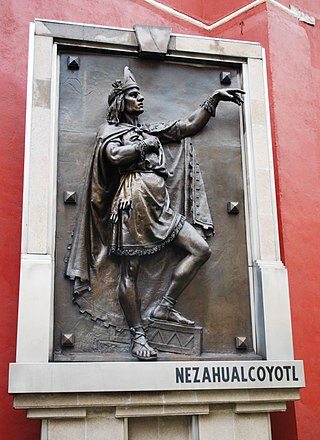
Nezahualcoyotl was a scholar, philosopher (tlamatini), warrior, architect, poet and ruler (tlatoani) of the city-state of Texcoco in pre-Columbian era Mexico. Unlike other high-profile Mexican figures from the century preceding Spanish conquest of the Aztec Empire, Nezahualcoyotl was not fully Mexica; his father's people were the Acolhua, another Nahuan people settled in the eastern part of the Valley of Mexico, on the coast of Lake Texcoco. His mother, however, was the sister of Chimalpopoca, the Mexica king of Tenochtitlan.

Nezahualpilli was king (tlatoani) of the Mesoamerican city-state of Texcoco, elected by the city's nobility after the death of his father, Nezahualcoyotl, in 1472. Nezahuapilli's mother was Azcalxochitzin, who married Nezahualcoyotl after the death of her first husband, King Cuahcuauhtzin of Tepechpan.

Eugene Field Sr. was an American writer, best known for his children's poetry and humorous essays. He was known as the "poet of childhood".
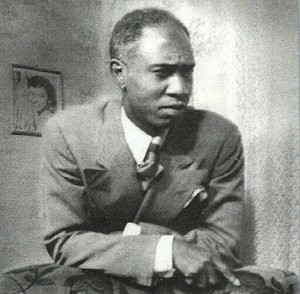
Melvin Beaunorus Tolson was an American poet, educator, columnist, and politician. As a poet, he was influenced both by Modernism and the language and experiences of African Americans, and he was deeply influenced by his study of the Harlem Renaissance.
Cuacuauhtzin was an Aztec poet, composing in the Nahuatl language, and lord of Tepechpan. Born around the year 1410, Cuacuauhtzin became lord when his father, Tencoyotzin died at a young age.

HuitzilihuitlNahuatl pronunciation: [wit͡siˈliwit͡ɬ](listen) or Huitzilihuitzin was the second Tlatoani or king of Tenochtitlan. According to the Codex Chimalpahin, he reigned from 1390 to 1415, according to the Codex Aubin, he reigned from 1396 to 1417 and according to the Codex Chimalpopoca, he reigned from 1403 to 1417.

Tezozomoc Yacateteltetl, was a Tepanec leader who ruled the altepetl of Azcapotzalco from the year 1353 or Five Reed (1367) or Eight Rabbit (1370) until his death in the year Twelve Rabbit (1426). Histories written down in the early colonial period portray Tezozomoc as a military and political genius who oversaw an expansion of Tepanec influence, bringing about Azcapotzalco's dominance in the Valley of Mexico and beyond.

John Allyn McAlpin Berryman was an American poet and scholar. He was a major figure in American poetry in the second half of the 20th century and is considered a key figure in the "confessional" school of poetry. His best-known work is The Dream Songs.

The Aztec Empire or the Triple Alliance was an alliance of three Nahua city-states: Mexico-Tenochtitlan, Tetzcoco, and Tlacopan. These three city-states ruled that area in and around the Valley of Mexico from 1428 until the combined forces of the Spanish conquistadores and their native allies who ruled under Hernán Cortés defeated them in 1521.

Árpád Tóth was a Hungarian poet and translator.
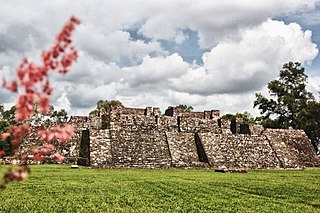
The Aztecs were a Pre-Columbian Mesoamerican people of central Mexico in the 14th, 15th, and 16th centuries. They called themselves Mēxihcah.
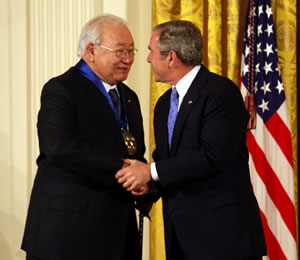
Navarre Scott Momaday is a Kiowa novelist, short story writer, essayist, and poet. His novel House Made of Dawn was awarded the Pulitzer Prize for Fiction in 1969, and is considered the first major work of the Native American Renaissance. His follow-up work The Way to Rainy Mountain blends folklore with memoir. Momaday received the National Medal of Arts in 2007 for his work's celebration and preservation of indigenous oral and art tradition. He holds 20 honorary degrees from colleges and universities and is a fellow of the American Academy of Arts and Sciences.
Maurice Frank Kenny was an American poet who identified as Mohawk descent.

The Acolhua are a Mesoamerican people who arrived in the Valley of Mexico in or around the year 1200 CE. The Acolhua were a sister culture of the Aztecs as well as the Tepanec, Chalca, Xochimilca and others.
Cihuacalli was an Aztec word that referred to buildings known as "women-house" which was a place for women's work. This likely included prostitution, but was not limited to that. It likely included kitchens or other areas for the drugery of woman's work. Under Montezuma I these buildings were also used as part of the ceremonies of fallen warriors, where an effigy was placed for four days for women to cry over and then moved in front of the temple to be burned. The Aztecs considered the prostitution in the Cahuacalli to be sacred and it catered to religious and political authorities.
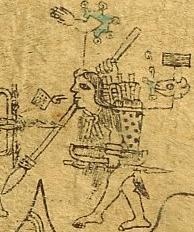
Quinatzin was a King of ancient Texcoco, an Acolhua city-state in Mexico. He was the first known ruler of that city and is also known as Quinatzin II.
Ayocuan, the son of Cuetzpaltzin the Elder, was from the city of Puebla according to Historia Tolteca-Chichimeca. His father governed the towns of Cohuayocan and Cuauhtepec during the 15th century. He lost his domain in 1441 when he suffered a joint attack by the people of Coatlinchan, Cholula, Huexotzinco, and Tlaxcala. Ayocuan was educated in the town of Quimixtlan.

Nathan Brown is an author, singer-songwriter, and award-winning poet who served as the Oklahoma Poet Laureate from 2013 to 2014.
Temilotzin was born in Tlatelolco and ruled Tzilacatlan. He rose to the rank of Tlacatecatl during his military time. He was a friend of Cuauhtemoc. He fought against the conquistadors during the Conquest of the Aztec Empire at Cuauhtemoc's side. He was present at the moment when the Spanish were leaving Tenochtitlan during La Noche Triste. He was at Cuauhtemoc's side when the Mexica had to surrender. He was forcibly sent to expedition to Honduras along with Cuauhtemoc. According to Anales de Tlatelolco, Temilotzin witnessed Cuauhtemoc hung from a ceiba tree.
Chichicuepon, was lord of Chalco, Mexico.
References
- Leon-Portilla, Miguel (2000). Fifteen Poets of the Aztec World. Oklahoma: University of Oklahoma Press.